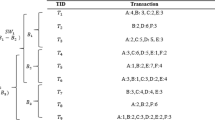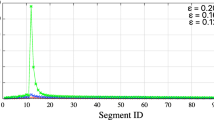Abstract
Closed itemset mining is a difficult problem especially when we consider the task in the context of a data stream. Compared to mining from a static transaction data set, the streaming case has far more information to track and far greater complexity to manage. In this paper, we propose a complete solution based on CLOSET+ algorithm to closed itemset mining in data streams. In data streams, bounded memory and one-pass constraint are expected. In our solution, these constraints are both taken into account.
Preview
Unable to display preview. Download preview PDF.
Similar content being viewed by others
References
Giannella, C., Han, J., Pei, J., Yan, X., Yu, P.S.: Mining Frequent Patterns in Data Streams at Multiple Time Granularities. In: Kargupta, H., Joshi, A., Sivakumar, K., Yesha, Y. (eds.) Next Generation Data Mining, AAAI/MIT (2003)
Pei, J., Han, J., Wang, J.: Closet+: Searching for the best strategies for mining frequent closed itemsets. In: SIGKDD 2003 (August 2003)
Liu, J., Pan, Y., Wang, K., Han, J.: Mining frequent item sets by opportunistic projection. In: SIGKDD 2002 (July 2002)
Zaki, M., Hsiao, C.: CHARM: An efficient algorithm for closed itemset mining. In: SDM 2002 (April 2002)
Burdick, D., Calimlim, M., Gehrke, J.: MAFIA: A maximal frequent itemset algorithm for transactional databases. In: ICDE 2001 (April 2001)
Han, E., Karypis, G., Kumar, V.: Scalable Parallel Data Mining for Association Rules. In: TKDE, vol. 12(2) (2000)
Pei, J., Han, J., Mao, R.: CLOSET: An efficient algorithm for mining frequent closed itemsets. In: DMKD 2000 (May 2000)
Han, J., Pei, J., Yin, Y.: Mining frequent patterns without candidate generation. In: SIGMOD 2000 (May 2000)
Pasquier, N., Bastide, Y., Taouil, R., Lakhal, L.: Discovering frequent closed itemsets for association rules. In: ICDT 1999 (January 1999)
Bayardo, R.J.: Efficiently Mining long patterns from databases. In: SIGMOD 1998 (June 1998)
Brin, S., Motwani, R., Ullman, J.D., Tsur, S.: Dynamic Itemset Counting and Implication Rules for Market Basket Data. In: SIGMOD 1997 (May 1997)
Gunopulos, D., Mannila, H., Saluja, S.: Discovering All Most Specific Sentences by Randomized Algorithms. In: ICDT 1997 (January 1997)
Toivonen, H.: Sampling Large Databases for Association Rules. In: VLDB 1996 (September 1996)
Park, J., Chen, M., Yu, P.S.: An Effective Hash Based Algorithm for Mining Association Rules. In: SIGMOD 1995 (May 1995)
Agrawal, R., Imielinski, T., Swami, A.: Mining association rules between sets of items in large databases. In: SIGMOD 1993 (May 1993)
Author information
Authors and Affiliations
Editor information
Editors and Affiliations
Rights and permissions
Copyright information
© 2005 Springer-Verlag Berlin Heidelberg
About this paper
Cite this paper
Wang, H., Li, W., Li, Z., Fan, L. (2005). Finding Closed Itemsets in Data Streams. In: Khosla, R., Howlett, R.J., Jain, L.C. (eds) Knowledge-Based Intelligent Information and Engineering Systems. KES 2005. Lecture Notes in Computer Science(), vol 3682. Springer, Berlin, Heidelberg. https://doi.org/10.1007/11552451_133
Download citation
DOI: https://doi.org/10.1007/11552451_133
Publisher Name: Springer, Berlin, Heidelberg
Print ISBN: 978-3-540-28895-4
Online ISBN: 978-3-540-31986-3
eBook Packages: Computer ScienceComputer Science (R0)




